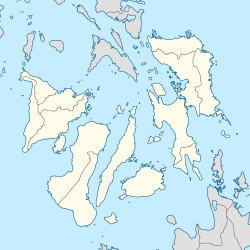Dumaguete | |
|---|---|
| City of Dumaguete | |
 Aerial view of Dumaguete | |
| Nickname: The City of Gentle People[1] | |
 Map of Negros Oriental with Dumaguete highlighted | |
Location within the Philippines | |
| Coordinates: 9°18′37″N 123°18′29″E / 9.31028°N 123.30806°E | |
| Country | Philippines |
| Region | Negros Island Region |
| Province | Negros Oriental |
| District | 2nd district |
| Cityhood | November 24, 1948 |
| Barangays | 30 (see Barangays) |
| Government | |
| • Type | Sangguniang Panlungsod |
| • Mayor | Felipe Antonio B. Remollo (LP) |
| • Vice Mayor | Ma. Isabel L. Sagarbarria (NPC) |
| • Representative | Manuel T. Sagarbarria (NPC) |
| • City Council | Members |
| • Electorate | 91,931 voters (2022) |
| Area | |
• Total | 33.62 km2 (12.98 sq mi) |
| Elevation | 183 m (600 ft) |
| Highest elevation | 1,844 m (6,050 ft) |
| Lowest elevation | 0 m (0 ft) |
| Population (2020 census)[4] | |
• Total | 134,103 |
| • Density | 4,000/km2 (10,000/sq mi) |
| • Households | 32,276 |
| Demonym(s) | Dumagueteño (masculine) Dumagueteña (feminine) |
| Economy | |
| • Income class | 2nd city income class |
| • Poverty incidence | 7.73 |
| • Revenue | ₱ 988.7 million (2020), 457.5 million (2012), 489.8 million (2013), 546.1 million (2014), 606.5 million (2015), 667.2 million (2016), 760.5 million (2017), 855.9 million (2018), 914.9 million (2019), 1,011 million (2021), 1,291 million (2022) |
| • Assets | ₱ 3,660 million (2020), 1,420 million (2012), 1,498 million (2013), 1,634 million (2014), 1,953 million (2015), 2,200 million (2016), 2,438 million (2017), 2,768 million (2018), 3,210 million (2019), 4,006 million (2021), 4,567 million (2022) |
| • Expenditure | ₱ 692.3 million (2020), 413 million (2012), 407.8 million (2013), 400.9 million (2014), 425.5 million (2015), 455.2 million (2016), 489.9 million (2017), 574.9 million (2018), 596.4 million (2019), 763.6 million (2021), 856.1 million (2022) |
| Service provider | |
| • Electricity | Negros Oriental 2 Electric Cooperative (NORECO 2) |
| • Water | Metro Pacific Dumaguete Water Services, Inc. (Metro Dumaguete Water) |
| Time zone | UTC+8 (PST) |
| ZIP code | 6200 |
| PSGC | |
| IDD : area code | +63 (0)35 |
| Native languages | Cebuano Magahat Tagalog |
| Website | www |
Dumaguete, officially the City of Dumaguete (Tagalog: [dʊmɐˈgɛtɛ]; Cebuano: Dakbayan sa Dumaguete; Filipino: Lungsod ng Dumaguete), is a 2nd class component city and capital of the province of Negros Oriental, Philippines. According to the 2020 census, it has a population of 134,103 people.[4] It is the most populous city and the smallest city by land area in Negros Oriental as well as one of the two regional centers in Negros Island Region (the other one is Bacolod).
Dumaguete is a university city with four large universities and several colleges, attracting students of the province and students from across the Visayas and Mindanao. The city is best known for Silliman University, the first Protestant and American university in the country and in Asia.[6] Schools in Dumaguete include 18 public elementary schools and eight public high schools.[1]
Dumaguete is bounded by the towns of Bacong, Sibulan, and Valencia. The power source of the city comes from the geothermal power plant in Valencia.
- ^ a b Cite error: The named reference
Tourismwas invoked but never defined (see the help page). - ^ City of Dumaguete | (DILG)
- ^ "2015 Census of Population, Report No. 3 – Population, Land Area, and Population Density" (PDF). Philippine Statistics Authority. Quezon City, Philippines. August 2016. ISSN 0117-1453. Archived (PDF) from the original on May 25, 2021. Retrieved July 16, 2021.
- ^ a b Census of Population (2020). "Region VII (Central Visayas)". Total Population by Province, City, Municipality and Barangay. Philippine Statistics Authority. Retrieved 8 July 2021.
- ^ "PSA Releases the 2021 City and Municipal Level Poverty Estimates". Philippine Statistics Authority. 2 April 2024. Retrieved 28 April 2024.
- ^ "Heritage Diary of Negros Oriental" Archived 2018-03-12 at the Wayback Machine. Inquirer.net. By: Dexter Matilla. Posted July 14, 2008. Accessed October 15, 2009.




